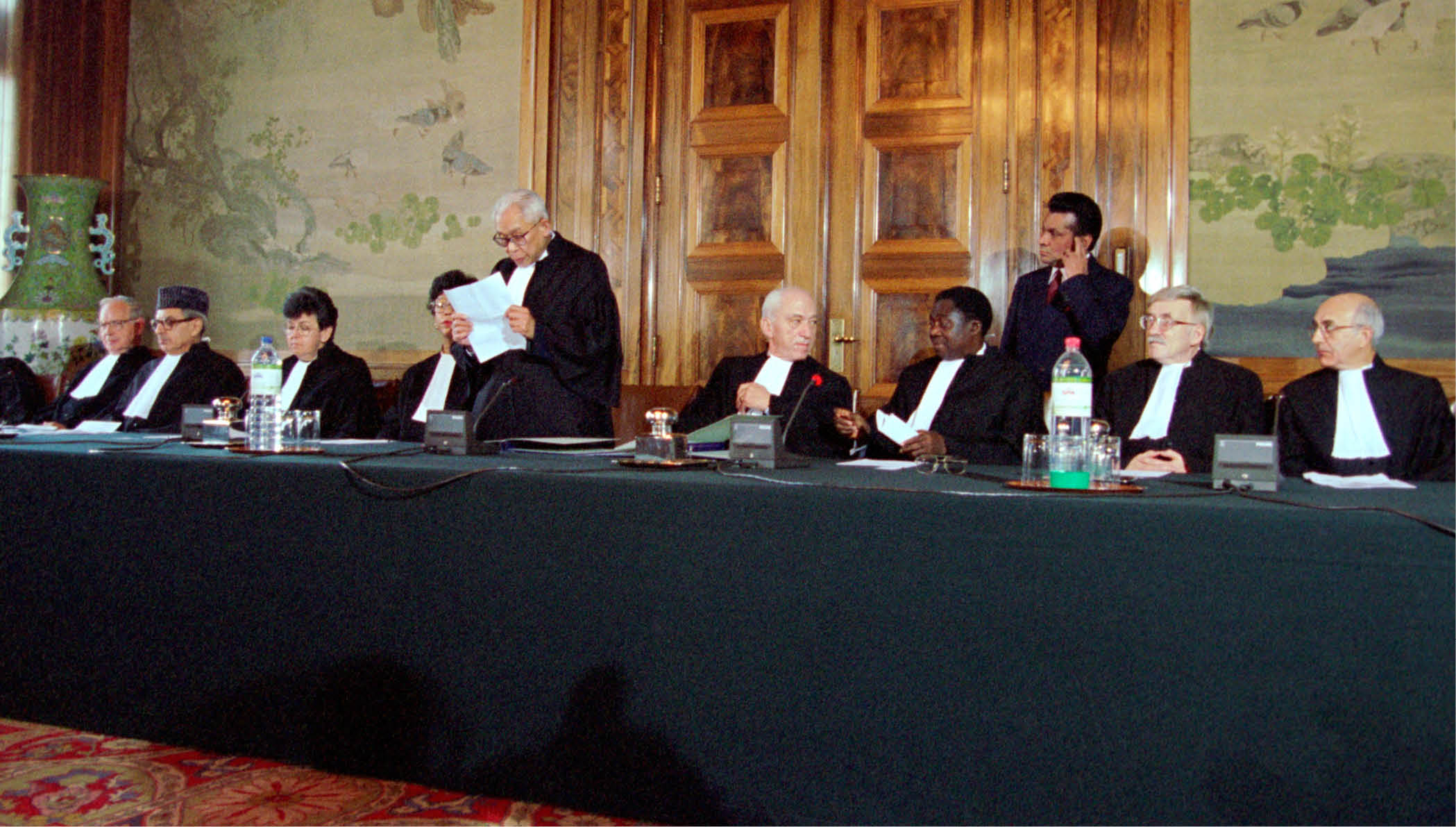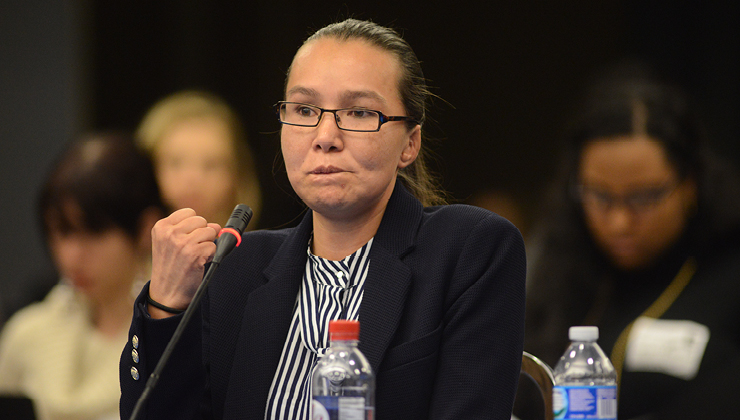Since 2019, the American Bar Association Center for Human Rights has been an implementing partner of the Clooney Foundation for Justice’s (CFJ) TrialWatch initiative, which monitors criminal trials globally against those who are most vulnerable – including women and girls – and advocates for the rights of the unfairly convicted. The views expressed herein have not been reviewed or approved by the House of Delegates or the Board of Governors of the American Bar Association and, accordingly, should not be construed as representing the policy of the American Bar Association.
November 25 marks the twenty-second year the global community has commemorated the International Day to End Violence Against Women. To truly end violence against women, we must combat cultural stereotypes about what makes a so-called “good woman,” which are undermining the ability of women to defend themselves in their homes, in the public sphere, and in the courts.
According to the United Nations, the scale of violence against women worldwide has only grown during COVID-19 – a “shadow pandemic.” At the same time, populist movements are increasingly impacting national dialogue and achieving political success that is, in part, driven by inflammatory rhetoric about the importance of so-called traditional gender values and gendered attacks on women in the press and on social media. In courtrooms around the world, the TrialWatch initiative has documented the harm that these gender stereotypes inflict on women’s right to a fair trial.
Punished for Survival
In Kyrgyzstan, where domestic violence is “commonplace”, abuse is typically viewed as the woman’s fault. According to Human Rights Watch, “[w]omen who complain about violence in the home or leave abusive partners are perceived as destroying the family, leaving their children as ‘orphans’ subject to immoral upbringing, and bringing disgrace onto themselves and their extended family.” One survivor who reached out to the police recounted her experience: “They said ‘Did he use a knife? Did he try to kill you?’ I would say, ‘No,’ and they would say, ‘Okay, you call me when he tries to kill you, because we have more important things to do.’” Relatedly then, women who defend themselves from such violence are severely punished.
In a case monitored by the ABA Center for Human Rights as part of TrialWatch in 2020, Gulzhan Pasanova, a long-term survivor of domestic violence, was charged with and convicted of causing grievous bodily harm for fatally injuring her husband, despite evidence she had been defending herself from a beating at the time. In court, the prosecution suggested that Pasanova was lying about the domestic violence, reasoning that she would not have stayed with her husband if she had truly been abused. In the prosecution’s words: “[n]o one forced Pasanova to give herself away, she chose [her husband] herself. If you do not want to live with your husband, get a divorce. Why kill him, then? All this led to your result.” She remains in prison.
This case is not unique. As documented by Penal Reform International in 2014, 20 per cent of all female prisoners in Kyrgyzstan had been convicted of causing the death of a male family member – a high number in comparison with other countries. A United Nations Population Fund report further found that 70 per cent of Kyrgyz women convicted of killing their husbands or other family members had experienced a “longstanding pattern of physical abuse or forced economic dependence.”
Punished for Poverty
In El Salvador, which has one of the world’s strictest bans on abortion, poor women have regularly been prosecuted for aggravated homicide in connection with obstetric emergencies suffered during childbirth. The ABA Center for Human Rights monitored two such cases through TrialWatch, including that of Evelyn Hernandez, who passed out in a pool of her own blood while giving birth at home. The prosecution argued that if she had been a good mother, she would have saved the child. Although Hernandez was ultimately acquitted during a retrial of the case, she was first convicted and spent almost three years in prison.
Unfortunately, Evelyn is not alone. According to a study published in the Health and Human Rights Journal, between 1999 and 2017, El Salvador convicted at least 34 women, many of whom had undergone miscarriages or stillbirths, of “aggravated homicide.” The study found that women convicted in these cases were almost always poor, lacked access to medical care, and were often rape victims. Their prosecutions were marred by a pattern of intense gender discrimination and apparent desire to punish the so-called “perverse mother.” Similarly, following a visit to El Salvador, the Special Rapporteur on violence against women documented cases in which women were convicted despite the prosecution’s failure to fulfil its evidentiary burden. In such proceedings, “negative stereotypes around the concept of the ‘bad mother’ and the ‘murderous mother’ are said to prevail.”
Punished for Speaking Out
United Nations Special Rapporteur on Freedom of Expression Irene Khan recently warned that “women’s voices are being suppressed by laws, policies of the state as well as social customs, traditions, interpretation of religion and growing fundamentalism around the world that has actually spurred also the growth of misogyny and sexism.” Through trial monitoring, we have seen women penalised not only for speaking against injustice but for violating gender roles in doing so.
Kenia Hernandez is an Indigenous land rights defender in Mexico. Earlier this year she was charged with aggravated robbery at the site of a protest convened by Indigenous rights organisations. Evidence has been presented that shows her in another location at that time and rights groups have alleged that her prosecution is retaliation for her activism. According to defence counsel, in denying Hernandez bail the judge noted that she protests a lot and that she was not submissive. Hernandez has already spent more than a year in jail as her case pends. She is currently on hunger strike and is facing up to 18 years in jail.
As stated by the UN Working Group on discrimination against women and girls, while all ”human rights defenders face risks of threats, attacks and violence,… [w]omen who do this work are exposed to additional, unique risks. WHRDs are targets of misogynistic attacks and gender-based violence.” In Mexico, UN experts have called on the authorities to “protect, not attack, women who peacefully demonstrate,” citing “machismo culture” and “gender stereotypes.”
“women’s voices are being suppressed by laws, policies of the state as well as social customs, traditions, interpretation of religion and growing fundamentalism around the world that has actually spurred also the growth of misogyny and sexism.”
Irene Khan, United Nations Special Rapporteur on Freedom of Expression
This policing of women’s conduct and language has been evident in a number of cases. In Malaysia, blogger Dian Abdullah was prosecuted for colourful blog posts that, among other things, condemned the Prime Minister’s mismanagement of the COVID-19 pandemic and resultant hardship. The prosecution described the posts as “abhorrent” and the police deemed them “discom[fiting].” Abdullah faces either a fine or up to two years in prison. In Peru, journalist Paola Ugaz is being sued for defamation by a conservative website for describing the website’s coverage as “misogynistic.” The website reportedly “call[ed] [her and her colleagues] ugly, fat, ignorant.” She faces up to three years in prison. As noted by the Inter-American Commission on Human Rights, “sexist and misogynist stereotypes [are] deeply rooted in Peruvian society” and, by extension, the justice system.
What Next
Combating gender biases and the violence they fuel requires holding perpetrators, including prosecutors and judges, accountable for violating the rights of women defendants and providing access to remedy. Our partners at CFJ have, for instance, taken Pasanova’s case to the UN Committee on the Elimination of Discrimination Against Women and filed an amicus brief supporting a test case in the Inter-American Court challenging El Salvador’s criminalisation of obstetric emergencies.
While dismantling dangerous gender stereotypes will require all sectors of society to grapple with ingrained norms, the courtroom should be a starting point and model: justice sector actors must protect, not undercut, the rights of women defendants, leaving misogyny at the door.
The views, thoughts and opinions expressed in this blog post are those of the author(s) only, and do not necessarily reflect LSE’s or those of the LSE Centre for Women, Peace and Security.
Image: Luiza Karimova works with Podruga, an organization based in Osh, Kyrgyzstan to end violence against women and assists women subjected to sex and drug trafficking. Credit: UN Women Europe and Central Asia (CC BY-NC 2.0)





